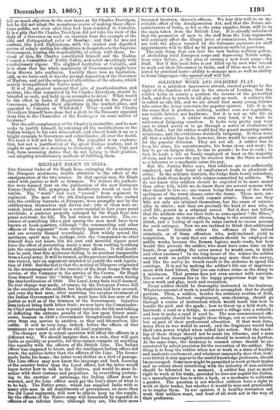MILITARY POLICY IN INDIA.
THE General Order of Sir Hugh Rose, enlarging the sentence on the Dinapore mutineers, recalls attention to the effect of the amalgamation of the two armies. In that special case, Sir Hugh acted with justice as well as firmness. We believe the authori- ties were warned that on the publication of the new European Forces (India) Bill, symptoms of disaffection- would at once be visible. The " word " had been "passed" from regiment to regiment. The men of the 5th European infantry who rushed into the artillery barracks at Dinapore, were promptly met by the artillerymen themselves and driven out ; two of them were ar- rested, tried, and sentenced by a court-martial to four years penal servitude, a sentence properly enlarged by Sir Hugh Rose into penal servitude for life. He had reason for severity. The ex- istence of something like a plot among the men must have been known at head-quarters, although "the commanding and other officers of the regiment" were entirely ignorant of its existence, and are severely blamed accordingly. How widely spread the mutinous spirit may be, perhaps even the Commander-in-chief himself does not know, but his just and merciful rigour must have the effect of preventing many a man from rushing headlong into the commission of the worst military offence. It will doubt- less be said, that this mutinous feeling is an accident inseparable from a Local army. It will be turned, as the previous insubordination was turned, into an argument intended to justify the rash legisla- tion of 1860. But the fact is that the mutiny at Dumpore originated in the mismanagement of the transfer of the local troops from the service of the Company to the service of the Crown. Sir Hugh Rose himself traces the "bitter fruit" to the seeds sown during the insubordination of 1859. The Local Army feels itself doomed. No real change was made, of course, by the European Forces Bill in the condition of the soldier, but his suspicions had been aroused, and even the best men, after receiving the cavalier treatment of the Indian Government in 1858-9, must have felt less sure of the justice as well as of the firmness of the Government. Injustice does indeed bring forth bitter fruit; we now have the Commander- in-Chief sentencing two men to penal servitude for life and talking of inflicting the extreme penalty of the law upon future muti- neers, because in 1859 a Government thoughtlessly handed men over from one service to another, as they said themselves, like cattle. It will be very long, indeed, before the effects of that treatment are rooted out of these old local regiments.
The changes now in actual operation will affect the officers in a different way. We should imagine that, as a rule, they will quit India as speedily as possible, for they cannot compete on anything like equality with the officers of the British Line. The Indian officer was supposed to know, and the intelligent Indian officer did know, the natives better than the officers of the Line. The former made India his home ; the latter went thither as a bird of passage. The Line officer may now know the language and book learning of the country better than the Local officer, but the latter would know better how to talk to the Natives, and would be more fa- miliar with their customs and prejudices. In everything pertain- ing to the exercise of patronage, the Indian officer must be worsted, and the Line officer must get the lion's share of what is to be had. The Native army, which has supplied India with so many able men in all departments of government, no more than the old Local regiments, will now be able to keep up the supply, for the officers of the Native army will henceforth be regarded as died" of an inferior force, although they are, like their more favoured brethren, Queen's officers. We fear this will be an in- evitable effect of the Amalgamation Act, and that the future ad- ministrators of India, so far as the army supplies them, will be in the main taken from the British Line. It is already calculated that the promotion of men to the staff from the Line regiments will seriously affect the illegal price of commissions, because, we are told, the places vacated by the fortunate aspirants for staff appointments will be filled up by promotions without purchase. The only thing that can save the new Indian military policy, of abolishing local European corps and depressing Native corps, from utter failure, is the plan of raising a new local corps—the Staff. But if this local force is not filled up by men who intend to work out their life-career in India, and if these men be not se- lected by practical tests—ability to manage men as well as ability to learn languages—the special staff will fail.


























 Previous page
Previous page